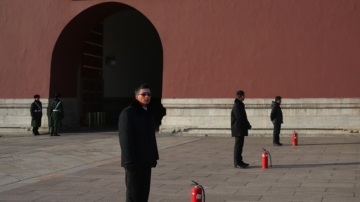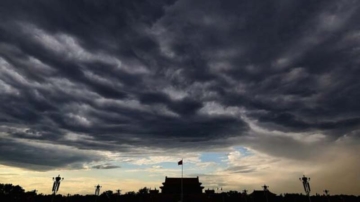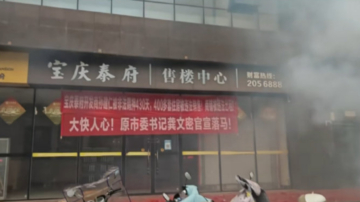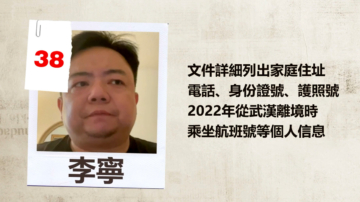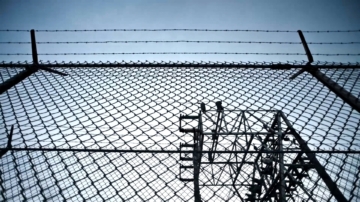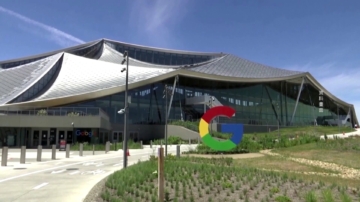【新唐人2014年03月27日訊】美國第一夫人米歇爾•歐巴馬26號即將結束對中國的訪問。她一如既往的將教育作爲出訪的重點。25號,她在四川成都發表演講時強調:人人平等、公民權利以及宗教自由等中共所謂的敏感話題。米歇爾訪華的最後一天,她還去了成都一家藏族餐館用餐。評論指出,米歇爾是一個有信仰、有原則的人,她最明白中國人民最需要甚麼。
3月26號,米歇爾•歐巴馬訪華的最後一天,她和她的母親以及女兒一起,去到四川成都市的一家藏族餐館用餐。被中國網民視為「含有政治色彩」。
四川與西藏自治區都有少數民族藏族居住。根據藏族名作家唯色的統計,2009年至今,已有133位藏人以自焚的方式,抗議中共當局壓制藏族的宗教和文化。
原國務院農村發展研究中心研究員姚監復:「歐巴馬在白宮見了達賴,所以她這次有點相呼應,但是她不直接去訪問西藏,所以她跟西藏人接觸我覺得有好處,她是夫人,我想她能夠促進民間的友誼,促進人民之間的互相了解。」
3月25號上午,米歇爾•歐巴馬在「成都第七中學」禮堂,向488名高一、高二學生,以及113位老師發表講話。
她說:「在美國,無論你住在哪裡,你是甚麼種族,宗教信仰,或民族,只要你努力工作,相信自己,那麼你就有機會取得成功。」
她還補充說,我們也相信每個人都是平等的,我們都有權利自由的表達我們的思想,我們有選擇宗教信仰的權利。
作爲第一位非洲裔美國籍的總統夫人,米歇爾表示,她和丈夫歐巴馬總統是美國「民權運動」的受益者。因為20世紀60年代在美國,掀起了對種族隔離運動的譴責,並呼籲種族平等,人們舉行和平抗議集會和遊行,要求政府官員更改不平等法律,雖然過程緩慢但可以肯定,最後美國政府改變了。
米歇爾表示,「我們已經擺脫那些不公正的法律。50年後的今天,我丈夫成為美國總統。」
米歇爾的演講觸及中共的敏感問題,在中國,民眾的抗議被視為非法。宗教信仰也受到當局的打壓和迫害
原《河北人民廣播電臺》編輯朱欣欣:「說明瞭歐巴馬伕人她是一個有信仰的人、有原則的人,她看到中國的一些現象,聽到的一些新聞,她覺得中國人民最需要聽甚麼樣的話,她現在是代表美國人民來訪問中國,她首先要面對的是中國人民,而不僅僅是中共這個當權者。」
原《河北人民廣播電臺》編輯朱欣欣表示,歐巴馬伕人米歇爾的中國之行,被稱為「教育和文化交流之旅」,她的一番言論,說出了中國人民的心聲。
朱欣欣:「我們不僅僅需要物質財富,更需要我們全面的人權,因為物質財富的不公、分配的不均,貧富的差別,就在於我們的人權是不完整的,我們政治權利的缺失,就會導致我們經濟權利的缺失,歐巴馬伕人可以說是對我們中國很了解。」
米歇爾訪問中國的第二天,也就是22號,她在「北京大學」演講時,也談到言論自由和普世權利。她說,只有當一個國家傾聽她的國民意見和聲音時,這個國家才會更強大。
23號,米歇爾在北京的美國大使館主持教育研討會,她呼籲應該重視教育和普及教育。她說,如果不是她的父母在她的教育方面進行投資,她就不會取得今天的成就。
原「國務院農村發展研究中心」研究員姚監復指出,中國也應該逐步的推進民主、自由、人權,因為這都是歷史發展的必然趨勢。他認為米歇爾的談話會給中國人帶來一些啟發和聯想。
米歇爾24號還到西安參觀兵馬俑,當天特警暴力清場,一名導遊因走得慢,被特警一腳踢得昏死過去。
四川維權組織「六四天網」負責人黃琦說,米歇爾25號訪問成都時,當地訪民想去米歇爾下榻的酒店附近一睹米歇爾的風采,結果多人被警方拘押、毆打,其中一位訪民被打昏送院搶救。
採訪編輯/李韻 後製/李勇
Michelle Obama Touches on Sensitive Issues
As the U.S. first lady Michelle Obama's visit in China is
coming to an end on the 26th, education continues to be her
focus.
On the 25th, she stressed sensitive topics in her speech in
Chengdu, Sichuan about equality, civil rights and religious
freedom.
On her last day in China she also visited a Tibetan restaurant in
Chengdu.
Analysts praise Michelle Obama, as a person of belief and
principle, who understands the fundamental need of the Chinese.
On March 26, the last day of the visit, Michelle Obama had lunch
with her mother and her daughters at a Tibetan restaurant in
Chengdu, Sichuan.
The minority Tibetans mainly live in Sichuan and the Tibet
Autonomous Region.
Tibetan writer Woeser indicated that since 2009, 133 Tibetans
have protested by self-immolation against the suppression of
the Tibetan religion and culture by the Communist authorities.
Yao Jianfu, former researcher of Rural Development Research
Center of the State Council: "Mr. Obama met with the Dalai
Lama at the White House, so she echoes that by interacting
with the Tibetans, rather than visiting Tibet.
I think it is good.
As the first lady, she helps to promote friendship and
mutual understanding between peoples."
On March 25 morning, Mrs. Obama talked to the 488 students
and 113 teachers at Chengdu's Number 7 School.
She said that in America, hard-working people can succeed
"no matter where you live or how much your parents have...
or what race, religion, or ethnicity you are."
She also praised America's progress on ethnic equality,
civil rights and religious freedom.
Mrs. Obama said that she and President Obama have benefited
from the rights movement.
The peaceful protests and marches in the 60s called on
government officials to change those laws of discrimination.
Slowly but surely, America changed,
Mrs. Obama said, "Today, 50 years later, my husband and I
are president and first lady of the United States."
Michelle Obama's speech touched the sensitive issue of the
CCP which consider protests as illegal,
and conduct suppression and persecution of religion.
Zhu Xinxin, former editor of Hebei People's Radio: "It tells
you that Mrs. Obama is a person of faith and principle.
She sees things and hears news and learns what the Chinese
need the most.
She visits China on behalf of the Americans.
It is the people she faces the first, not just the CCP authorities."
Former editor of Hebei People's Radio Zhu Xinxin indicates
that Mrs. Obama's trip to China was an exchange of education
and culture, and her speech spoke for the Chinese.
Zhu Xinxin: "We need more than material wealth.
We need even more about human rights.
The cause of the injustice, unevenness and difference in wealth
is exactly due to lack of human rights.
Lack of political rights will lead to the deficiency in our
economic rights.
I would say that Mrs. Obama knows much about China."
Mrs. Obama spoke of universal rights, freedom of speech,
in her speech at Peking University on the 22nd,
"Because time and again, we have seen that countries are
stronger and more prosperous when the voices and opinions
of all their citizens can be heard."
In a discussion about education at the U.S. Embassy in Beijing
on Sunday morning, Mrs. Obama said that she wouldn't be
where she is today without her parents investing and pushing
her to get a good education.
Former researcher of Rural Development Research Center of
the State Council, Yao Jianfu, indicates that China should
gradually promote democracy, freedom, and human rights,
as the inevitable trend of historical development.
He believes Michelle's talks will serve as an inspiration to the
Chinese.
In order to prepare for Michelle Obama's visit to the terra-cotta
warriors in Xi'an on the 24th, special police conducted violent
clearance of the site.
A tour guide fainted from police kicking due to his slow response.
Sichuan activist and also the founder of 64tianwang.com
founder Huang Qi says that local petitioners went to get a
closer look at Mrs. Obama at the Chengdu hotel but met arrest
and beating by the police.
A petitioner lost consciousness from the beating and was
rushed to the emergency room.
Interview & Edit/Li Yun Post-Production/Li Yong
3月26號,米歇爾•歐巴馬訪華的最後一天,她和她的母親以及女兒一起,去到四川成都市的一家藏族餐館用餐。被中國網民視為「含有政治色彩」。
四川與西藏自治區都有少數民族藏族居住。根據藏族名作家唯色的統計,2009年至今,已有133位藏人以自焚的方式,抗議中共當局壓制藏族的宗教和文化。
原國務院農村發展研究中心研究員姚監復:「歐巴馬在白宮見了達賴,所以她這次有點相呼應,但是她不直接去訪問西藏,所以她跟西藏人接觸我覺得有好處,她是夫人,我想她能夠促進民間的友誼,促進人民之間的互相了解。」
3月25號上午,米歇爾•歐巴馬在「成都第七中學」禮堂,向488名高一、高二學生,以及113位老師發表講話。
她說:「在美國,無論你住在哪裡,你是甚麼種族,宗教信仰,或民族,只要你努力工作,相信自己,那麼你就有機會取得成功。」
她還補充說,我們也相信每個人都是平等的,我們都有權利自由的表達我們的思想,我們有選擇宗教信仰的權利。
作爲第一位非洲裔美國籍的總統夫人,米歇爾表示,她和丈夫歐巴馬總統是美國「民權運動」的受益者。因為20世紀60年代在美國,掀起了對種族隔離運動的譴責,並呼籲種族平等,人們舉行和平抗議集會和遊行,要求政府官員更改不平等法律,雖然過程緩慢但可以肯定,最後美國政府改變了。
米歇爾表示,「我們已經擺脫那些不公正的法律。50年後的今天,我丈夫成為美國總統。」
米歇爾的演講觸及中共的敏感問題,在中國,民眾的抗議被視為非法。宗教信仰也受到當局的打壓和迫害
原《河北人民廣播電臺》編輯朱欣欣:「說明瞭歐巴馬伕人她是一個有信仰的人、有原則的人,她看到中國的一些現象,聽到的一些新聞,她覺得中國人民最需要聽甚麼樣的話,她現在是代表美國人民來訪問中國,她首先要面對的是中國人民,而不僅僅是中共這個當權者。」
原《河北人民廣播電臺》編輯朱欣欣表示,歐巴馬伕人米歇爾的中國之行,被稱為「教育和文化交流之旅」,她的一番言論,說出了中國人民的心聲。
朱欣欣:「我們不僅僅需要物質財富,更需要我們全面的人權,因為物質財富的不公、分配的不均,貧富的差別,就在於我們的人權是不完整的,我們政治權利的缺失,就會導致我們經濟權利的缺失,歐巴馬伕人可以說是對我們中國很了解。」
米歇爾訪問中國的第二天,也就是22號,她在「北京大學」演講時,也談到言論自由和普世權利。她說,只有當一個國家傾聽她的國民意見和聲音時,這個國家才會更強大。
23號,米歇爾在北京的美國大使館主持教育研討會,她呼籲應該重視教育和普及教育。她說,如果不是她的父母在她的教育方面進行投資,她就不會取得今天的成就。
原「國務院農村發展研究中心」研究員姚監復指出,中國也應該逐步的推進民主、自由、人權,因為這都是歷史發展的必然趨勢。他認為米歇爾的談話會給中國人帶來一些啟發和聯想。
米歇爾24號還到西安參觀兵馬俑,當天特警暴力清場,一名導遊因走得慢,被特警一腳踢得昏死過去。
四川維權組織「六四天網」負責人黃琦說,米歇爾25號訪問成都時,當地訪民想去米歇爾下榻的酒店附近一睹米歇爾的風采,結果多人被警方拘押、毆打,其中一位訪民被打昏送院搶救。
採訪編輯/李韻 後製/李勇
Michelle Obama Touches on Sensitive Issues
As the U.S. first lady Michelle Obama's visit in China is
coming to an end on the 26th, education continues to be her
focus.
On the 25th, she stressed sensitive topics in her speech in
Chengdu, Sichuan about equality, civil rights and religious
freedom.
On her last day in China she also visited a Tibetan restaurant in
Chengdu.
Analysts praise Michelle Obama, as a person of belief and
principle, who understands the fundamental need of the Chinese.
On March 26, the last day of the visit, Michelle Obama had lunch
with her mother and her daughters at a Tibetan restaurant in
Chengdu, Sichuan.
The minority Tibetans mainly live in Sichuan and the Tibet
Autonomous Region.
Tibetan writer Woeser indicated that since 2009, 133 Tibetans
have protested by self-immolation against the suppression of
the Tibetan religion and culture by the Communist authorities.
Yao Jianfu, former researcher of Rural Development Research
Center of the State Council: "Mr. Obama met with the Dalai
Lama at the White House, so she echoes that by interacting
with the Tibetans, rather than visiting Tibet.
I think it is good.
As the first lady, she helps to promote friendship and
mutual understanding between peoples."
On March 25 morning, Mrs. Obama talked to the 488 students
and 113 teachers at Chengdu's Number 7 School.
She said that in America, hard-working people can succeed
"no matter where you live or how much your parents have...
or what race, religion, or ethnicity you are."
She also praised America's progress on ethnic equality,
civil rights and religious freedom.
Mrs. Obama said that she and President Obama have benefited
from the rights movement.
The peaceful protests and marches in the 60s called on
government officials to change those laws of discrimination.
Slowly but surely, America changed,
Mrs. Obama said, "Today, 50 years later, my husband and I
are president and first lady of the United States."
Michelle Obama's speech touched the sensitive issue of the
CCP which consider protests as illegal,
and conduct suppression and persecution of religion.
Zhu Xinxin, former editor of Hebei People's Radio: "It tells
you that Mrs. Obama is a person of faith and principle.
She sees things and hears news and learns what the Chinese
need the most.
She visits China on behalf of the Americans.
It is the people she faces the first, not just the CCP authorities."
Former editor of Hebei People's Radio Zhu Xinxin indicates
that Mrs. Obama's trip to China was an exchange of education
and culture, and her speech spoke for the Chinese.
Zhu Xinxin: "We need more than material wealth.
We need even more about human rights.
The cause of the injustice, unevenness and difference in wealth
is exactly due to lack of human rights.
Lack of political rights will lead to the deficiency in our
economic rights.
I would say that Mrs. Obama knows much about China."
Mrs. Obama spoke of universal rights, freedom of speech,
in her speech at Peking University on the 22nd,
"Because time and again, we have seen that countries are
stronger and more prosperous when the voices and opinions
of all their citizens can be heard."
In a discussion about education at the U.S. Embassy in Beijing
on Sunday morning, Mrs. Obama said that she wouldn't be
where she is today without her parents investing and pushing
her to get a good education.
Former researcher of Rural Development Research Center of
the State Council, Yao Jianfu, indicates that China should
gradually promote democracy, freedom, and human rights,
as the inevitable trend of historical development.
He believes Michelle's talks will serve as an inspiration to the
Chinese.
In order to prepare for Michelle Obama's visit to the terra-cotta
warriors in Xi'an on the 24th, special police conducted violent
clearance of the site.
A tour guide fainted from police kicking due to his slow response.
Sichuan activist and also the founder of 64tianwang.com
founder Huang Qi says that local petitioners went to get a
closer look at Mrs. Obama at the Chengdu hotel but met arrest
and beating by the police.
A petitioner lost consciousness from the beating and was
rushed to the emergency room.
Interview & Edit/Li Yun Post-Production/Li Yong


